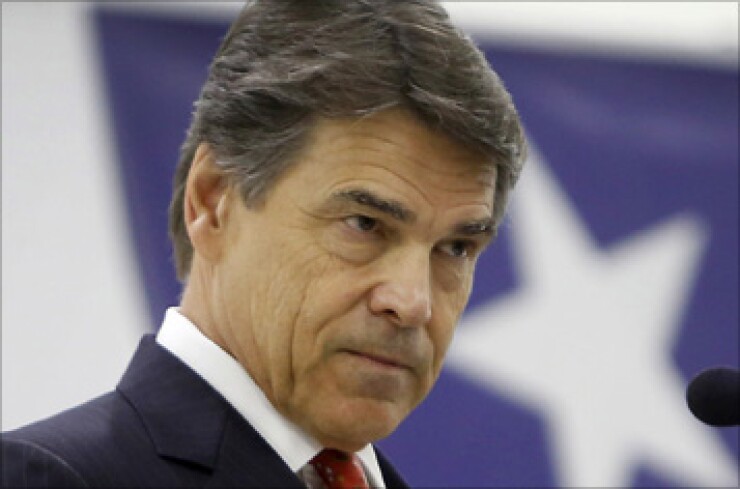
DALLAS — Texas Gov. Rick Perry's rejection of Medicaid expansion for the working poor will cost state taxpayers $9.2 billion in 2022, according to a study by the Commonwealth Fund.
Twenty states, most with Republican governors, have refused funding for the expansion of the health insurance program, a loss equivalent to more than twice the amount of federal transportation funding in 2022, reported the fund, which describes itself as a private foundation supporting independent research on health policy reform.
Researchers said they picked the year 2022 as most representative.
Florida Gov. Rick Scott's rejection of the funds will cost his state's taxpayers more than $5 billion, according to the study.
Virginia will forgo more than $2.8 billion, representing 2.5% of federal taxes paid by state taxpayers, the study said.
In Georgia, Gov. Nathan Deal's decision will cost taxpayers $4.9 billion, and in turn, $2.8 billion will flow out of the state in 2022, according to the study.
In South Dakota and Wyoming, taxpayers will face a net cost of $224 million and $166 million in 2022, respectively.
Some Republican governors have defied the party, agreeing to expand the program to ease budget crunches. Arizona Gov. Jan Brewer's decision to accept the federal funds will mean an increase of about $1.6 million of tax revenue, according to the study.
The federal government has pledged to cover the costs of the Medicaid expansion fully through 2017, then decrease it incrementally to 90% by 2020. Hospitals in states that are not expanding Medicaid are expected to lose more than $200 billion over the next 10 years, according to a report from Fitch Ratings.
Governors who rejected the Medicaid expansion cited what they consider incursions into "states' rights" and said that the expansion would ultimately end up straining state budgets.
"It is difficult to see how expanding Medicaid without reform would do anything other than put more strain on state budgets and the taxpayers, especially when considering that many pernicious provisions that curtail state flexibility remain," outgoing Virginia Gov. Bob McDonnell wrote in a letter to President Obama on behalf of the Republican Governors Association that he chairs.
California would be the biggest beneficiary of the Medicaid expansion, according to the study, with an 11.8% increase in federal funding and a gain of $12.7 million in 2022.
"The increase in federal funding in 2022 from participating in the Medicaid expansion is roughly equivalent to one-quarter of the total value of federal procurements for that year and more than twice as much as all federal funding for highways," according to the study.
"Even states that do not value the health and health system benefits of expanding Medicaid may value the expansion as a source of funds that benefits the state economy."
Perry, who has been criss-crossing the country in anticipation of a presidential run in 2016, has taken a defiant position on the issue of the Affordable Care Act.
"Expanding Medicaid would mandate the admission of millions of additional Texans into the already unsustainable Medicaid program, at a potential cost of billions to Texas taxpayers," Perry said in a prepared statement opposing the expansion and creation of a state exchange for private insurance companies.
"I will not be party to socializing health care and bankrupting my state in direct contradiction to our Constitution and our founding principles of limited government," he said.





